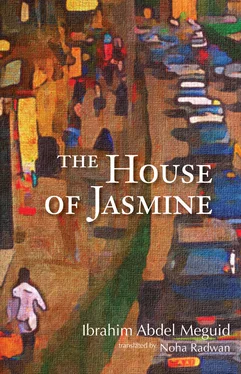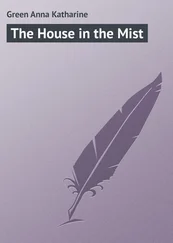“No sooner had I graduated from the school of agriculture than I was drafted into the army. I was dragged into defeat in my first war, and I was surrounded in the second. I was neither sad nor frustrated, but now that I’m out, I feel like I’m on one side and the rest of this universe which God created for us is on the other. Do you really think that I like backgammon or sitting at the café? Do you think that we’ll keep doing this forever? If so, then the tragedy will be complete. The normal thing would be for us to separate, for each of us to go his own way, and make a life for himself, and for each of us to remember the others from time to time. Yet we can’t, not because Dikhayla is so small — nothing more than one street and a few alleys — but because none of us has a purpose to his life. Do you know why Hassanayn insists on studying at his age? Don’t tell me that it’s to get a university degree. What is a degree worth in the age of people like ‘Abdu al-Fakahani? In reality, it’s because if Hassanayn doesn’t study, he will find time to think about himself!
“And you. You have an apartment and you live alone and have no responsibilities. But you also don’t want to get a life of your own. Why don’t you get married, now that you have taken the most difficult step? Are you enjoying the life you’re living? I don’t think so, but I don’t think it’s too bad either. It’s just bland. You must be aware of this, but unwilling to face it. The only one who has found a purpose to his life is Magid. Now he’s the manager of his own pharmacy. Yet instead of making it serve a real purpose in his life — that is, to make it a base for further progress — it has become his life. He hides in it from the world, and rarely leaves.
“I’m just like the rest of you, or maybe worse. My days present no new challenges in which I can prove myself a winner or a loser, only a routine job in agricultural inspection in Rashid. I often feel too lazy to go to work. I sleep until noon, and my boss never questions me. If you ask me about agriculture, you’ll discover that I have forgotten everything about it, but if you ask me about any other job, I will tell you that I’m only an agricultural engineer. None of us has been successful at anything, but we have not been failures either. We stand in a vacuum.
“Now I’m out of the army, and I don’t like talking about my experiences there. I don’t know how I survived. This is my final conclusion. I try to put an iron curtain between me and my past.
“I only failed with one person, a young soldier who joined the army five years after I did. I was drawn to his beautiful baby face and his calm soothing voice. I always felt that he was older than I was. He used to fill our trenches with stories from every time and place. He always had a new novel for you to read. I could hardly believe that he was a medical doctor. A few days before the war, he met with me alone after midnight and said that we had to meet after the war. ‘I agree. After the war,’ I said, with a smile. He said that he was not joking and that the war was going to begin in a few days. How did he know that? I, and thousands like me, were bored with the military drills and the waiting, but we didn’t see a war coming. He was different from everyone I knew. He wasn’t in contact with any authority which could inform him of the date of the war. He was just an ordinary soldier, and none of us knew anything about the war until it started. Even the officers didn’t know about it, and the rest of the people must not have known about it either. You must have read about this in the newspapers. I asked him why he wanted us to meet after the war. He asked me in turn what I did on my days off. I said that I saw my parents, my brothers and sisters, played backgammon with my friends, and slept. He asked me what they talked about. I said that at the café, we only played backgammon, and at home everyone fought. He said that our life was lost between fighting and playing. The country itself was lost, and had to be saved. Then he said, in an amazingly casual manner, that he and I could do it, and that, of the hundreds that he met in the army, I was the only one fit for this mission.
“He said that we were going to conquer Israel, not because we were stronger, but because we were going to fight with a suicidal spirit. ‘The trenches and the continuous drills make death part of daily life. We will fight because we will be ready to sacrifice ourselves. Suicide can also be an investment. This is what will happen,’ he said, and once again added, ‘in a few days.’
“I was shaking as I listened to him talk, and almost cried with him when he cried. I couldn’t sleep that night, nor for several nights afterward. During the first few days of the war, the battles seemed to me like dreams. I was asleep as I crossed the Suez Canal, asleep as I ran on the sands of Sinai, and once I actually fell into a real sleep for a long time. It was during a big attack on our new position on the east bank of the canal. The raid ended and the dead were carried to the west bank while I was actually in a deep sleep. I haven’t seen him since that day. I didn’t shed a single tear, because soldiers don’t cry. But the question has often tortured me: Am I really capable of leading a revolution in this country? And why? I don’t personally feel that anyone else has a problem. Everyone I know manages somehow. I have often tried to define a goal for myself, but I can never find one. When I got out of the army, I realized that I was thirty-three years old, and that even the clothes and hairstyles had changed. Someone over thirty like me can’t do anything, but you, you, Shagara, and Hassanayn and Magid, are really at fault, because you have had a real opportunity to keep track of the years as they passed by. You can think I’m crazy if you wish.”
This was what ‘Abd al-Salam said to me on the last night before he left for Iraq while the two of us were walking home together. We always passed by the house of jasmine and found it dark except for a faint light behind the windows. We fell silent, and I wondered what ‘Abd al-Salam was thinking as he passed the house. Maybe he also wondered what I was thinking. After he left, I decided to always walk home on a parallel street and not pass by the house of jasmine again.
I thought that ‘Abd al-Salam was like the thousands of young men who worked abroad to earn the money necessary for securing an apartment and getting married, but then I realized that this was not his goal. The modest means of his family didn’t bother him either, for he never talked about that, explicitly or implicitly. At some point I thought that he was like Sayyid Birsho, but the sadness in his voice told me that he was different, a type of person that I have never been able to fully understand. In any case, he wasn’t crazy. He was like the many young people who stand at the bus station, distracted and oblivious to the burning sun over their heads, unaware that if they moved a few steps they could be standing under an awning. I often noticed these people and caught myself at the bus station counting the people standing at a distance from the awning. Maybe ‘Abd al-Salam was different from those people, too. The fact was that I couldn’t understand him. I liked him even before we met, and I still like him. Magid received a letter from him and brought it to the café, so we learned that he had found a job in a place called Khalis, not far from Baghdad, on a greenhouse farm. We took down his address, and every time we met, we said that we should write back to him. Each one of us decided to write, but never did. It seemed that we only remembered him when we were together. Maybe we felt guilty, or felt like vindicating ourselves. The summer and winter had already passed.
On Labor Day, only the members of the workers’ union went to the celebration, as they had the year before. On the twenty-sixth of July, the President came to Alexandria by helicopter, and so there were no reception ceremonies. It was said that the helicopter was a gift from President Nixon, which he had presented to President Sadat in 1974. How horrifying! Nixon gives the President a helicopter and puts an end to the ceremonies, my annual source of income. But I had decided not to go out with the workers anymore, so why should I be so frustrated?
Читать дальше












